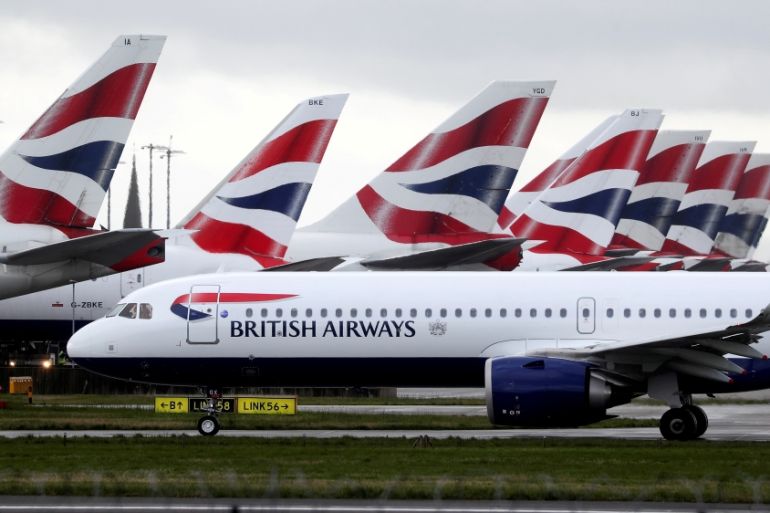UK airlines, fighting to keep staff, ask for more wage subsidies
The global drop in travel demand due to the coronavirus outbreak has also squeezed Norwegian Airlines’ cash flow.

The United Kingdom’s airlines want the government’s coronavirus wage support scheme to be extended beyond June, maintaining the assistance for longer with a slow recovery in air travel expected.
Airlines UK, the industry’s representative body, wrote to the finance minister requesting an extension of the scheme, which airlines including British Airways and easyJet have used to furlough workers.
Keep reading
list of 3 itemsVirgin Australia enters bankruptcy proceedings as sales plunge
Airfares fall across Europe, US as travel demand plunges
Under the Coronavirus Job Retention Scheme, the government pays 80 percent of the wages of staff who are temporarily laid off, up to 2,500 pounds ($3,107) a month.
Airlines, many of which have grounded the majority of their fleets, have used the scheme to avoid making staff redundant in the hope that when travel restrictions are eased and demand returns, they can restart operations.
The scheme runs until the end of June, but the airlines want it to be extended “to avoid aviation facing a cliff-edge post-June, whilst services are scaled-up”, Airlines UK said in its letter.
Global industry body IATA has predicted a slow recovery in air travel and warned that many airlines could go out of business, with European traffic currently down by 90 percent.
UK-based airline Virgin Atlantic is in talks with the UK government about a bailout package to help it survive.
Air travel faces a further headache as the government said it was considering the possibility of requiring passengers to go into quarantine for two weeks once they arrive in the UK.
Asked about the extension of the job retention scheme for airlines, junior health minister Edward Argar told Sky News on Monday that he knew the finance minister Rishi Sunak was keeping the schemes under review.
“I know that the Chancellor is very, very aware of how important the airline industry is,” he said.
Running out of cash
Across Europe, Norwegian Air warned on Monday that it could run out of cash by mid-May unless its proposed financial rescue plan is approved by creditors and shareholders.
If approved by bondholders, leasing companies and shareholders, the plan may help the budget air carrier survive the coronavirus outbreak, which has grounded 95 percent of its fleet, leaving just seven aircraft in operation.
But the planned debt-to-equity swap will hand majority ownership of 53.1 percent to the company’s lessors, while bondholders would own 41.7 percent, leaving current shareholders with just 5.2 percent, it said.
The move would allow Norwegian to tap government guarantees of 2.7 billion kroner ($255m), which are dependent on the company reducing its ratio of debt to equity, and which would come on top of 300 million ($28.4m) kroner it has already received.
It is “critical to get access to the state aid package by mid-May before the company runs out of cash,” Norwegian said in a presentation to investors.
Rapid growth has made Norwegian Europe’s third-largest low-cost airline and the biggest foreign carrier serving New York and other major cities in the United States, but with the expansion came debts and liabilities of close to $8bn by the end of 2019.
Last week, the company reported that four Swedish and Danish subsidiaries had filed for bankruptcy and that it had ended staffing contracts in Europe and the US, putting some 4,700 jobs at risk.
Norwegian’s shares opened 8 percent lower on Monday and are down 86 percent year-to-date.
The company aims to gradually emerge from the COVID-19 crisis with both a short-haul and long-haul network in place, and is targeting a return to normal operations in 2022, it said.
The plan requires backing from bondholders in each of four separate votes planned for April 30, from shareholders in an extraordinary general meeting scheduled for May 4, and from leasing firms.
It maintained plans to raise up to 400 million kroner ($37.9m) in cash from owners.